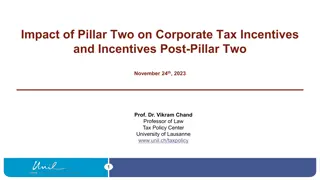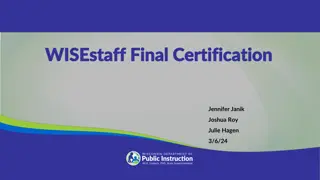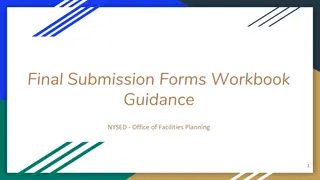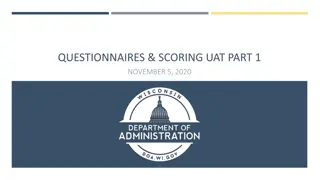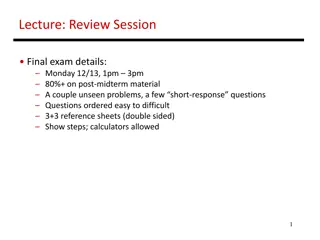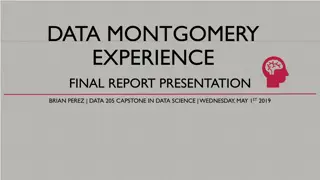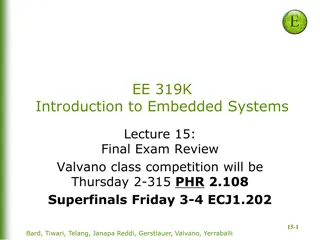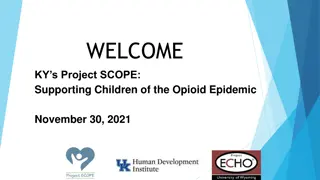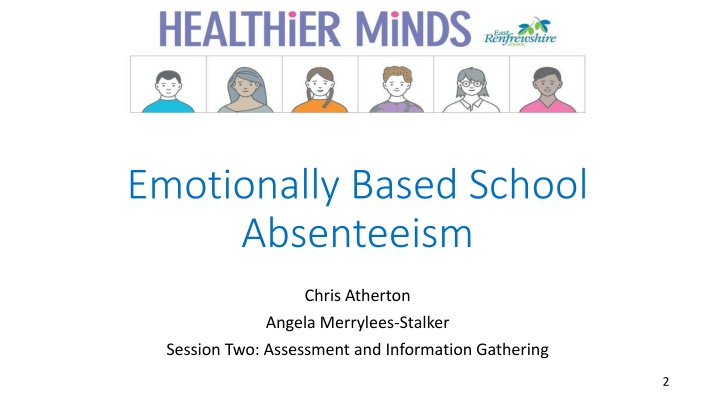
Emotionally Based School Absenteeism
Learn about the importance of early identification and assessment of emotionally based school absenteeism, including strategies for effective intervention. Explore guiding principles, potential traps to avoid, and key considerations in supporting parents and children in addressing this issue.
Download Presentation

Please find below an Image/Link to download the presentation.
The content on the website is provided AS IS for your information and personal use only. It may not be sold, licensed, or shared on other websites without obtaining consent from the author. If you encounter any issues during the download, it is possible that the publisher has removed the file from their server.
You are allowed to download the files provided on this website for personal or commercial use, subject to the condition that they are used lawfully. All files are the property of their respective owners.
The content on the website is provided AS IS for your information and personal use only. It may not be sold, licensed, or shared on other websites without obtaining consent from the author.
E N D
Presentation Transcript
Emotionally Based School Absenteeism Chris Atherton Angela Merrylees-Stalker Session Two: Assessment and Information Gathering 2
Session Two Early Intervention Assessment Information: Functional and Ecological Information Gathering Case Study: your own experience Q&A A
As quickly as possible Early identification, assessment and response is key Initial threshold for concern is two weeks Monitoring and checking in with parents is often best through the very early stages parental empowerment to address the situation is very important, however adaptations should still be considered early on by the school to alleviate stressors that will undermine the parents' efforts (e.g. being challenged for timekeeping, attending to smaller details like uniform policy compliance, deadlines for homework, upcoming assessments etc.) Initiating contact and developing a relationship with the parents is critical. Creating an alliance base on honest, empathy and respect will help in times ahead if things get particularly stressful. If the parent is struggling and or feeling judged / blamed, the possibility of splitting between home and school is strengthened (parents blame the school, school blame the parents the stalemate in which everyone loses, especially the young person). C
Early Intervention Guiding principles Support parents and the child / young person to engage with all relevant appointments with school and multi- agency partners where appropriate Support the parents to implement a school day within the home (no access to phones / TV. Boredom is an effective strategy in itself. Encourage school preparatory behaviours include morning routines, breaks, lunch and wearing of school uniform, even when home. Ensure academic work is made available for completion at home when the child / young person doesn t make it into school C
Developmental acquiring a good understanding of the young persons growth and development e.g. their journey with their family, their friends, their experience of educational environments, and any additional support needs arising from developmental or neurodevelopmental differences that they may have (e.g. physical, sensory, social communication, learning differences etc.) Relational examining relationships the child / young person has with peers and adults at home and in the school, and also the relationship between parents /carers and key members of school staff Effective Assessment and Intervention Interactional acknowledging that factors which can be considered within-child (e.g. anxiety, low mood, social communication differences) only become problematic as a result of the individuals experience of their environment and their interactions within that e.g. through people, subjects places and rules / expectations. Functional developing a more forensic understanding of what is strengthening the school avoidant behaviours and what is weakening the desire to attend school (the push and pull factors) Targeted Holistic wellbeing assessment that is ecological and contextual taking account of home, school and community factors (a robust GIRFEC approach) that leads to clearly identified plans that minimise risks and maximise opportunities to change the course of the child / young person s journey.
Functional Analysis What is the problematic behaviour? What is maintaining the behaviour? What is the behaviour trying to achieve? Effective monitoring of attendance and late coming will give insight: Examine total absences from school, whether authorised and explained or not Look for patterns Parental acquiescence Family transitions School based threats Social isolation Difficulties with academic work Kearney and Albano (2018)C
Functional Assessment The School Refusal Assessment Scale (Revised) by Kearney and Albano (2018) supports practitioners to identify which of these four common functions is most dominant: To avoid school-related objects and situations (stimuli) that provoke negative affectivity (symptoms of dread, anxiety, depression, and somatic complaints) To escape aversive social and or evaluative situations at school To receive or pursue attention from significant others outside of school To pursue tangible rewards outside of school A
Other Examples of Direct Assessment Anxiety (e.g. Spence) Academic self concept (e.g. Reading self concept scale, Motivation for Reading Questionnaire) Educational assessment (e.g. WIAT) Resilience assessment (e.g. Resiliency Scales for Children and Adolescents) C
Group Discussion How you would use these resources in your role? Think about a young person in your setting and work out how you might approach the information gathering for them? What else would you need to consider? 15 minutes. See you soon. C
Meet John John is 10 years old. He has always enjoyed school. During the first lockdown John tried really hard to engage in online learning but it was a struggle. The family had one device which was shared with 2 other siblings. John attended the Hub at his primary school 3 days a week and was able to work independently when there. When the schools returned John s attendance was sporadic. His family were shielding and mum reported that he was required to stay at home. During the second lockdown things changed for John. He stopped logging on, stopped engaging and found the transition back to school really challenging. John s attendance has dipped consistently since April 2021 when schools went back full time. He cries each morning, tells mum he feels sick and refuses to cross the door. He does get up and get ready but the morning can take a turn for the worse when it is time to leave the house. John promises to try each evening but when it comes to leaving the house he gets extremely upset. Mum has her own physical and mental health concerns therefore finds it tricky to cope with the upset each day. Johns siblings are late for school, unless mum makes the decision to leave him at home and drop off her other children and the secondary school. Mum feels that she no longer has a choice but to leave John at home to ensure her other children get to school on time. Whilst at home, since August, John has spoken to his class teacher once on Google Classroom and the Depute Head Teacher once at the door of his house. He has asked for Mrs Smith (the Pupil Support Assistant from last year) to visit him because she is the kindest person and doesn t shout but that has not yet been possible. John no longer goes out with friends and describes himself as too scared to leave the house at weekends. John s family have reported really struggling with the situation and don t know what else to do to support him. 2
Group Discussion: Feedback How you would use these resources in your role? Think about a young person in your setting and work out how you might approach the information gathering for them? What else would you need to consider? C
So far Reviewed terms used to describe Emotional Based School Absenteeism Considered the impact of the language we use to frame the issue Touched upon (because the complexity cannot be underestimated) motivating factors and their contribution to ESBA Explored motivating factors through case study Discussed the importance of early intervention Introduced the starting point for information gathering through Functional and Ecological assessment information A
Q & A 2
Thank you for taking the time to join us. If you have any questions before we next meet on 25th April please feel free to get in touch. Next Peer Coaching Session: 28th March at 3.45pm. Angela.Merrylees@eastrenfrewshire.gov.uk 07788 496 711 2



